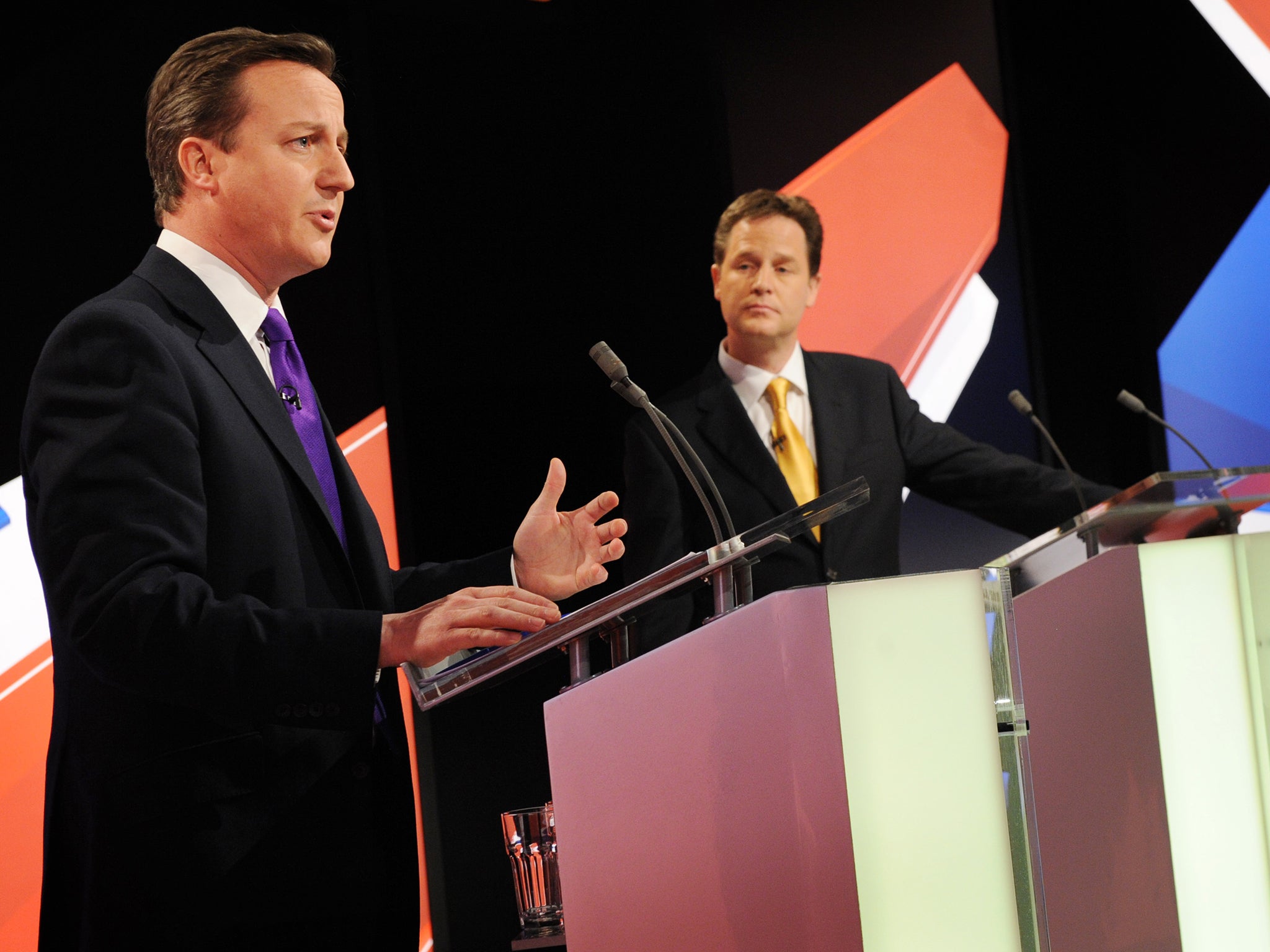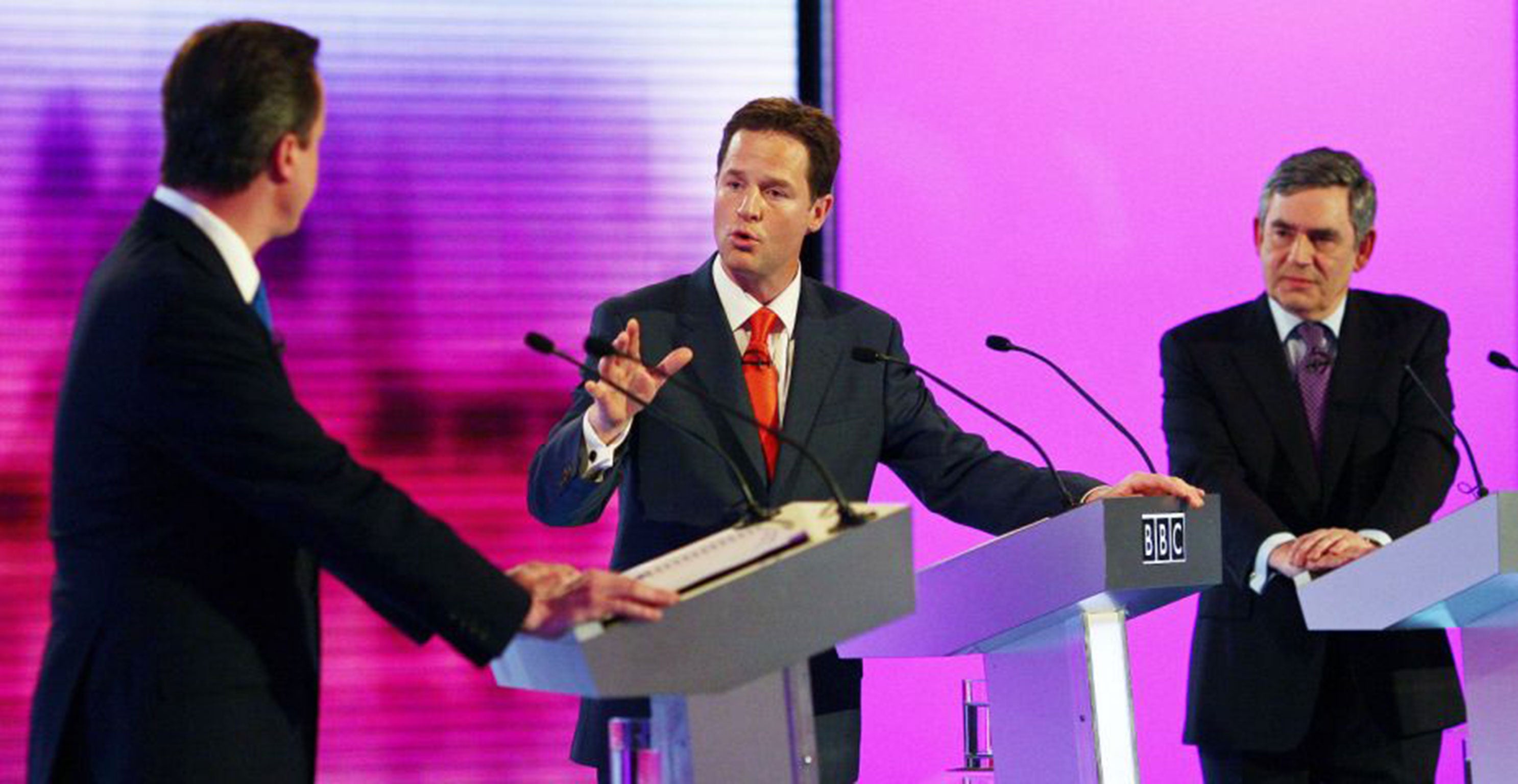David Cameron accused of using Ofcom ruling to quash leaders’ TV debates
PM insists Bennett must be included but regulator says Greens are still not ‘major party’

Your support helps us to tell the story
From reproductive rights to climate change to Big Tech, The Independent is on the ground when the story is developing. Whether it's investigating the financials of Elon Musk's pro-Trump PAC or producing our latest documentary, 'The A Word', which shines a light on the American women fighting for reproductive rights, we know how important it is to parse out the facts from the messaging.
At such a critical moment in US history, we need reporters on the ground. Your donation allows us to keep sending journalists to speak to both sides of the story.
The Independent is trusted by Americans across the entire political spectrum. And unlike many other quality news outlets, we choose not to lock Americans out of our reporting and analysis with paywalls. We believe quality journalism should be available to everyone, paid for by those who can afford it.
Your support makes all the difference.David Cameron has been accused of using an Ofcom ruling as cover for an attempt to torpedo televised leaders’ debates in the run-up to the general election in May.
The row blew up after the media regulator ruled that the Green Party did not have enough support across the country to be treated by broadcasters as a “major party” during the campaign.
However, it said it believed that Ukip, which topped the poll in last year’s Euro-elections and won two parliamentary by-elections, should be added to the major party list entitling it to the same airtime as the Conservatives, Labour and Liberal Democrats.
Although the issues are not formally linked, Ofcom’s decision will undermine the Green Party’s demands to be included in any televised leaders’ debates.
The broadcasters’ current proposals only involve the Conservatives, Labour, the Lib Dems and Ukip.

Mr Cameron repeated last night his opposition to the debates being staged without the Greens, which Labour and the Lib Dems claim is a ruse for scuppering them altogether.
The Prime Minister told ITV News: “I don’t think the current proposal will work. You can’t have one minor party without having another minor party, and I think that’s only logical and fair.”
Ed Miliband, the Labour leader, responded: “The Prime Minister should be able to stand on his record and stop running scared.”
A Labour source added: “David Cameron is fooling no one but is making a fool of himself.”
The Deputy Prime Minister, Nick Clegg, tweeted: “Come on David Cameron, the broadcasters have invited us, the public expect it, just say yes and stop making excuses.”
The Ofcom interim ruling means that Nigel Farage’s party will now be afforded the same treatment by broadcasters in England and Wales as the main Westminster parties in the run-up to 7 May.
Qualifying for “major party” status would increase the number of party political broadcasts the Greens could make as well as guaranteeing coverage in television and radio bulletins.
Ofcom’s initial ruling was that the party, including the Scottish Greens, had not “secured sufficient support in previous elections and current opinion polls” to be included. Its decision will now go out to consultation.
The Green Party leader in England and Wales, Natalie Bennett, said the “deeply disappointing” draft ruling risked damaging British democracy.
“The media regulator has failed to grasp the fast-moving, fluid state of British politics today, and the fact that voters are seeking out the choice of real change,” she said.
“Ofcom should not be making that option harder to find, but ensuring voters have the chance to hear and judge the full range of political options today.”
The BBC, ITV and Sky News have proposed three debates – one between David Cameron and Ed Miliband; one in which they are joined by Nick Clegg; and a four-way debate including the Ukip leader, Nigel Farage.
The Green Party has reacted furiously to Ms Bennett’s potential exclusion and has gathered more than 275,000 signatures in a petition backing its case.
The party, which is defending one parliamentary seat and aiming to win two more, is averaging around 7 per cent in the polls. Some recent surveys put it ahead of the Lib Dems in support.
The Greens have called for an urgent meeting with the regulator and the party also said it would take legal advice over the ruling.
Caroline Lucas, the Green MP for Brighton Pavilion, said: “Not only is this grossly unfair, but it denies the public the opportunity to hear from a fresh voice.”
Join our commenting forum
Join thought-provoking conversations, follow other Independent readers and see their replies
Comments